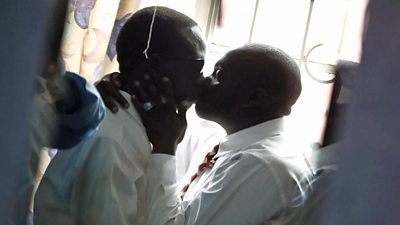Image: Richard Gadd and Daniel Mays as journalist Peter Wildeblood (convicted 'of homosexuality' in the 1950s) in the 2017 drama 'Against the Law', part of the Gay Britannia series.
The ±«Óătv set out to mark the 50th anniversary of the Sexual Offences Act, 1967 with its Gay Britannia season, showcasing new and provocative stories that celebrate the LGBT+ community as well as challenging existing preconceptions and prejudices. The Corporation has come along way since its first efforts to represent the diversity of sexual communities in the UK in its output.
±«Óătv History Manager John Escolme examines some of the ±«Óătv's most noticeable attempts at engaging with the LGTB+ audience, selecting some key programmes from across the decades.

Understanding the LGBT+ audience
Tucked away on the ±«Óătv Third programme, at 7.30 on a Tuesday evening in 1955, Homosexuality and Christianity appears to be the first programme on ±«Óătv Radio to directly address what was then generally thought of as the "problem" of homosexuality. The programme no longer exists in ±«Óătv Archives, but featured Dr. Robert Casey, Dean of Sidney Sussex College, Cambridge, giving his views following a reading Dr. Sherwin Bailey's book Homosexuality and the Western Christian Tradition.
Such was the strong dominance of the Church in the United Kingdom at the time, that exploring sexuality in relation to religion provided a reassuring context for a heterosexual audience rarely exposed to discussions about human sexual desire, and identity.
The of interviews with former ±«Óătv staff, rarely mentions LGBT+ issues arising amongst the programme makers interviewed. However, it is clear that from the 1960s, attitudes amongst those holding creative positions started to slowly wake up to the existence of LGBT+ communities, and their rich potential for documentary or drama.
±«Óătv output shows a gradual sophistication, sensitivity, and slow realisation that the LGBT+ community also consumes ±«Óătv content, and is not an outsider group prepared to accept judgement or commentary on "their" lifestyle from a dominant heterosexual perspective.
The ±«Óătv programmes below exemplify the change in the ±«Óătvâs understanding of its LGBT+ audience from 1957 until the present.
The Wolfendon Report, 1957
±«Óătv Television news addressed LGBT+ issues seriously for the first time as The Wolfendon Report hit the headlines.
As chairman of the Committee on Homosexual Offences and Prostitution, Sir John Wolfenden appeared on the ±«Óătv's only TV channel to discuss the committee's report soon after its publication, which recommended partial de-criminalisation of homosexuality.
Wolfendon's report also recommended that the law should safeguard public order, and not regulate people's private lives.
The findings were reported with an air of cool frankness in the ±«Óătv bulletins of the time, but tended not to question the link Wolfendon made between homosexuality and prostitution:
Male Homosexual, 1965
In this programme, made two years before the decriminalisation of same-sex relationships in England and Wales, a group of men discussed what was then "their problem", the issue of acceptance in society, and public reactions to their love.
The broadcast contains outmoded attitudes towards sexual orientation, but provides a fascinating insight into a time when gay men risked social stigma and imprisonment. Women were ignored in the programme:
This Time Of Day - Lesbianism, 1965
Reporter Wendy Jones talked to lesbians in the UK, some who lived "underground", but others "openly" with their partners.
Jones interviewed a psychiatrist and a member of the Minorities Research Group, both of whom advocated rights for lesbians at a time when their sexual orientation was seen as a "problem" to be "cured", and when they barely existed under UK law:
Man Alive - Consenting Adults: 1. The Men, 1967
In the first part of a special Man Alive report, Jeremy James interviewed gay men about their feelings, and explored the opinions of society towards the gay community at the time.
The contributors included a hairdresser, a doctor and a woman whose husband committed suicide rather than face a court case that would have revealed his sexual orientation.
The language used in the programme is often blunt and reflects the attitudes of the time:
Man Alive - Consenting Adults: 2. The Women, 1967
In the second part of the Man Alive special report, Angela Huth interviewed lesbians about their lives.
Julie and Cynthia lived together for many years. When this programme was made the couple felt a need to state that they saw no difference between their relationship and that of a heterosexual couple.
The programme visited a private club in Chelsea, then a much needed safe haven for lesbians that allowed women to celebrate being themselves without risking condemnation from a prejudiced society:
Open Door - Transex Liberation Group, 1973
"Jokes about 'the operation' are all that most people know about transexualism. Tonight's group discuss their situation in a more serious and comprehensive way, and draw attention to the many difficulties they endure."
Radio Times, 2 June 1973 - 8 June 1973
Looking at the work of programme makers or reading the ideas of commentators of the time, it would seem they found it impossible to comment on, or construct a programme about the trans community in any way other than in the context of there being "a problem" or a difficult issue to be solved.
To some extent this edition of Open Door changed all that, allowing the trans community editorial control over their own programme.
Whilst the issues of the day facing the trans community were addressed, there was more a sense of celebration in this all-trans presented programme. Women transitioning to men are completely absent in the programme:
Gaytime TV, 1995
"First of a new lifestyle magazine programme aimed at the lesbian and gay male audience. Promising glamour, wit, a glittering array of celebrities and exclusive reports on gay life worldwide, this first programme looks at the first school for gay teenagers, based in New York. It also boards a bus carrying transvestites and lesbians down the M1 to the Pride '95 festival in London."
Radio Times 24 June 1995 - 30 June 1995
"The ±«Óătv's first series aimed primarily at a gay audience starts a six-week run tonight in the old Late Show slot, offering a selection of reports, performances and interviews with a stress on entertainment rather than issues."
Todayâs Choices, Radio Times 24 June 1995 - 30 June 1995
By the 1990s the ±«Óătv was beginning to understand the LGBT+ audience as one with a diversity of its own, one that had a sense of confidence, one that liked to party and celebrate.
Although there were still serious issues facing the LGBT+ community, the tone of the programme along with presenters Bert Tyler Moore and comedian Rhona Cameron, gave Gaytime TV a splash of glamour and fun.
Gay Britannia, 2017
In the second decade of the 2000s, the ±«Óătv would appear to understand its LGBT+ audience in an arguably more nuanced way.
50 years after homosexuality was partially decriminalised in the UK, ±«Óătv Two Channel Controller Patrick Holland announced a major new season of programmes Gay Britannia to mark the moment. "This season is a powerful examination of how far we have come - whilst also exploring how much further we have to travel" he said.
The season included a new drama, Against The Law, with Daniel Mays as journalist Peter Wildeblood (convicted 'of homosexuality' in the 1950s, in the Montagu Trial); to the first screen drama from best-selling British novelist Patrick Gale, Man In An Orange Shirt, starring Vanessa Redgrave.
There were also important documentaries such as Is It Safe To Be Gay in The UK? which looked at the recent rise of attacks on lesbian, gay and transgender people.
Anniversary, 2022
2022 was the 50th Anniversary of Pride in the UK, and to mark the moment throughout June new commissions ran on ±«Óătv Two, ±«Óătv Three and ±«Óătv Four across music, history, documentary and entertainment. The Loud and Proud season on ±«Óătv Radio 6 Music, plus podcasts and series on ±«Óătv Radio 4 and ±«Óătv Sounds ensured audio fans were not left out.
Whilst the anniversary explored the national picture of LGBT+ lives across the UK, a regional perspective drilled down to some unique and revealing local stories.
We Are England is a series of documentaries made by the ±«Óătvâs regional teams, based in Birmingham, London, Bristol, Leeds, Newcastle and Norwich, covering issues of mental health, education, family and belonging.
One programme followed drag queen Bimini Bon Boulash who rose to fame on RuPaulâs Drag Race UK, from humble beginnings in Yarmouth. Although not winning the competition, Bimini went on to strutt the catwalk at London fashion week, published an autobiography, posed for high-profile photo shoots and launched a music career!
Whilst the film followed Biminiâs new found success, it also traced, sensitively, an exploration of the LGBT+ scene that allowed Bimini to discover drag and a non-binary identity.
Cherry Valentine: Gypsy Queen and Proud, 2022
One criticism sometimes levelled at ±«Óătv LGBT+ programmes is lack of nuance. Every community has within it multiple layers and identities, and few programmes have attempted to depict this level of subtlety.
±«Óătv Three has gone some way toward allowing layered and multiple sexual identities to break through in its documentaries.
At 18, George Ward left the Gypsy community after coming out as gay. Leaving his Gypsy identity behind, he invented Cherry Valentine, a drag alter ego. Now, he wants to be accepted as a queer Gypsy, in Cherry Valentine: Gypsy Queen and Proud.
In My Skin, 2023
Where once television drama depicted LGBT+ lives as tragic or at best âdifficultâ, in 2023 the mood feels more celebratory.
Pairing this more positive approach with unusual genres has further altered the LGBT+ TV landscape.
In My Skin sees 16-year-old Bethan, dealing with both the comical and painful anxieties of teenage life, along with the stark reality of a home life that is far removed from what she projects to her friends.
Central to the comedy is Bethanâs first forays into her lesbian identity â a light touch to something very personal.
Where next?
Arguments still abound as to the amount of LGBT+ portrayal that exists on the ±«Óătv, be it through drama, documentary, or across other genres. And trans portrayal and coverage in particular remains a hot topic, mirroring clashing debate in wider society.
Those interested in LGBT+ issues will have a view as to how well the ±«Óătv deals with portrayal and output, and the balancing act is likely to continue to be a difficult one.
Yet, some previously marginalised communities have hit the mainstream - the widespread popularity of RuPaul and same-sex partnering on Strictly attest to that.
Generally there seems to be a greater willingness amongst programme makers to create more LGBT+ content. And, where once programmes âlooked in atâ LGBT+ lives, now the LGBT+ community is much more at the centre of programme makers thinking, and the portrayal of multi-layered diverse communities is beginning to break through.
Related links
-
Gay Britannia A season marking the passing of the 1967 Sexual Offences Act, 2017
-
Gay Britannia on Radio 4 Extra Radio clips
-
Free Thinking: Queer Icons: Plato's Symposium Shahidha Bari discusses the LGBTQ movement in the history of philosophy as part of the ±«Óătv's Queer Icons series.

